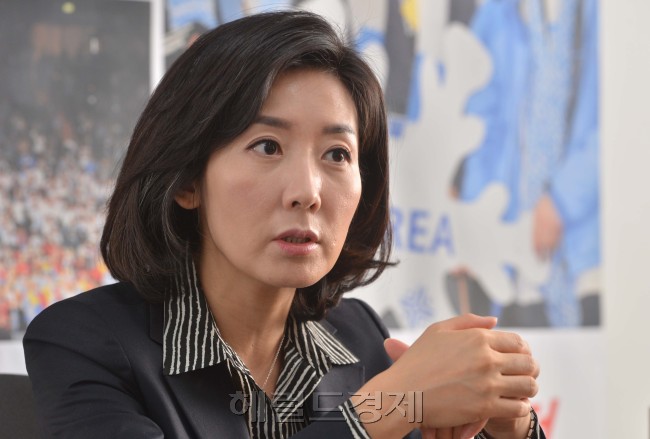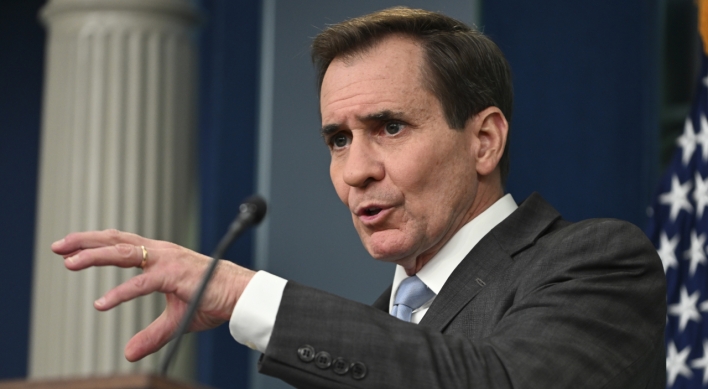Organizer seeks more inclusive Special Olympics
Na says seven countries making debut, expresses hopes for changes in attitude toward intellectually disabled
By Korea HeraldPublished : Dec. 16, 2012 - 20:36
More than 3,000 intellectually disabled athletes and officials will gather in Korea next month from all over the world for the Special Winter Olympics.
The Special Olympics World Winter Games is analogous to the Olympics in a similar way to how the Paralympics is for the physically challenged.
At the center of preparations for the quadrennial Special Olympics, to be held in Pyeongchang, Gangwon Province, from Jan. 29 to Feb. 5 next year is Na Kyung-won, chairwoman of the organizing committee.
Special hands & global development summit
“The organizing committee has extended ‘special hands’ to seven nations,” Na told The Korea Herald.
The host country has invited seven Asian countries that have never participated in the Winter Special Olympics because of economic and other reasons. The seven are Mongolia, Papua New Guinea, Thailand, Vietnam, Pakistan, Cambodia and Nepal.
“I hope this program will continue into future Special Olympics,” she said.
The Special Olympics World Winter Games is analogous to the Olympics in a similar way to how the Paralympics is for the physically challenged.
At the center of preparations for the quadrennial Special Olympics, to be held in Pyeongchang, Gangwon Province, from Jan. 29 to Feb. 5 next year is Na Kyung-won, chairwoman of the organizing committee.
Special hands & global development summit
“The organizing committee has extended ‘special hands’ to seven nations,” Na told The Korea Herald.
The host country has invited seven Asian countries that have never participated in the Winter Special Olympics because of economic and other reasons. The seven are Mongolia, Papua New Guinea, Thailand, Vietnam, Pakistan, Cambodia and Nepal.
“I hope this program will continue into future Special Olympics,” she said.

She expects the Special Hands Program to raise awareness of the mentally disabled and also improve related welfare systems in underdeveloped or developing countries.
“During the Special Olympics, we will also hold a global development summit on the human rights and policy issues concerning those with intellectual disabilities,” Na said.
“Myanmar opposition politician Aung San Suu Kyi will visit PyeongChang for the summit.”
“Suu Kyi symbolizes human rights and democracy. Her presence is sure to attract an international attention to the summit, which will deal with human rights and policy issues of those with intellectual disabilities,” Na said.
Past Special Olympics have held symposiums, but PyeongChang Special Olympics will be the first to hold a summit which will deal with a profound and concrete agenda, she said.
About 300 distinguished figures are expected at the summit on Jan. 30-31. They will discuss how to end poverty and exclusion for those with intellectual disabilities.
Malawian President Banda Joyce, Prime Minister of Jamaica Portia Lucretia Simpson-Miller, and Bangladeshi Prime Minister Sheikh Hasina will attend the forum.
“We are going to announce the PyeongChang Declaration after the summit,” Na said.
Ties with Special Olympics
Her ties with the Special Olympics date back to the 2009 Winter Games in Idaho.
It was five years earlier when she first learned of the existence of such games for the intellectually disabled. She went to Idaho to watch the Games.
“Korean team members wore cheap dowdy uniforms. They were so poorly made that the insignia stickers kept coming off,” she said.
At that time the government provided little financial assistance to the Korean delegation to Special Olympics.
It spoke volumes about the level of Korean welfare for the disabled, though Korea had a large economy.
After the Idaho Special Olympics, she took action. She made a successful bid to host the following games.
Like building a snowman
Na faced difficulties in early days due to low awareness of Special Olympics.
“We started from scratch. In the beginning, we were not confident we could make it. Things did not look positive at first, but we had to make it no matter what,” she said.
The Special Olympics itself is little known in Korea. It does not receive financial support from the International Olympic Committee, though it approves the use of the word “Olympics.”
Nonetheless, securing funds for the operation of the large-scale event has been a crucial job for the chief organizer.
It takes about 39 billion won ($35 million) to hold the 2013 PyeongChang Special Olympics. The fund comes from three sources: the central government (30 percent), Gangwon Province (12 percent) and voluntary sponsors (58 percent), according to the organizing committee.
It is wholly up to the organizing committee to find sponsors. The Special Olympics are less marketable than the Olympics so it is difficult to secure sponsorship from companies or for-profit organizations.
“It (attracting sponsors) was like building a snowman. At first, it was hard, but as we kept rolling it, it became easier to make it bigger,” Na said.
The organizing committee has reached more than 93 percent of its sponsorship target.
“I think we can raise the remaining funds through small-sum sponsorships from individuals.”
In January, the organizing committee joined forces with Naver Bean, an online channel for small donations.
“A small interest in the Special Olympics by individuals and organizations will sow the seeds of its success,” she said.
Hope for start of change
The Special Olympics needs more volunteers than the Olympics. Intellectually disabled athletes need a lot of help from the non-disabled. Nevertheless she has created a volunteer corps of about 100 mentally disabled people.
Under the leadership of non-disabled volunteers, they will help out with minor things. What’s important is they get involved.
“Intellectually disabled people should be given a chance to get involved in many activities. So I formed the volunteer group,” she said.
She wants to make the 2013 PyeongChang Special Olympics World Winter Games a milestone to raise the public awareness of the mentally disabled.
“Even now, many people do not pass disabled persons without looking at them twice. They get a glance of discrimination and a glance of sympathy.”
“I’d like to see our society look at the disabled once, just like we do when we walk past the non-disabled.”
She said she hoped the PyeongChang Special Olympics would become the starting point for a remarkable change in Koreans’ view of the disabled.
“Currently, I am concentrating on the last-stage preparations,” she said. “After the Games, I will continue to work for the intellectually disabled. It is an ongoing part of my life. It does not need to be a grand event.”
“The intellectually disabled, for one, should not hide from society but come forward proudly,” she added.
By Chun Sung-woo (swchun@heraldcorp.com)
-
Articles by Korea Herald





![[Music in drama] Rekindle a love that slipped through your fingers](http://res.heraldm.com/phpwas/restmb_idxmake.php?idx=644&simg=/content/image/2024/05/01/20240501050484_0.jpg&u=20240501151646)




![[New faces of Assembly] Architect behind ‘audacious initiative’ believes in denuclearized North Korea](http://res.heraldm.com/phpwas/restmb_idxmake.php?idx=644&simg=/content/image/2024/05/01/20240501050627_0.jpg&u=20240502093000)








![[Today’s K-pop] Stray Kids go gold in US with ‘Maniac’](http://res.heraldm.com/phpwas/restmb_idxmake.php?idx=642&simg=/content/image/2024/05/02/20240502050771_0.jpg&u=)